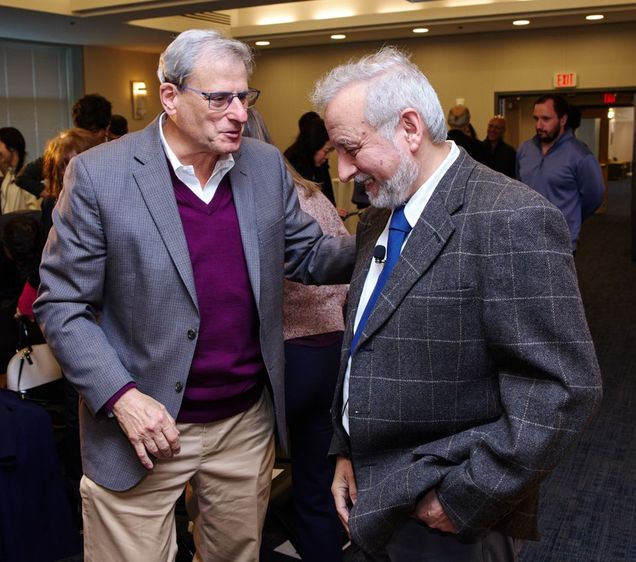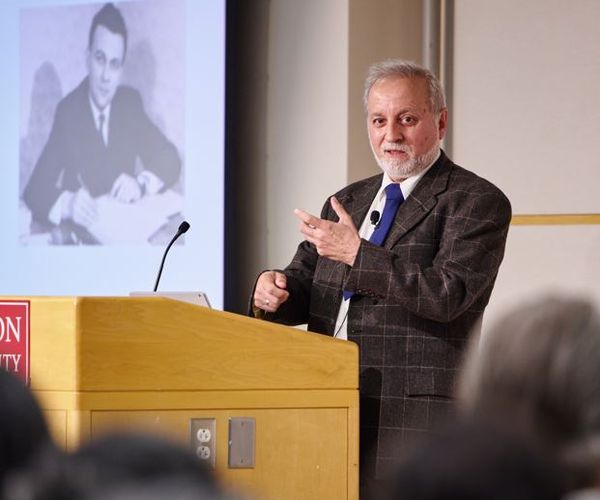Multidisciplinary expert presents lung complexities at signature ENG event
By Patrick L. Kennedy
Professor Béla Suki (BME, MSE), recipient of the 2025 Charles DeLisi Award and Distinguished Lecture, delivered “Complexity in Translational Biomechanics and Mechanobiology” to a capacity crowd in the Boston University Photonics Center’s Colloquium Room on April 3.
A native of Hungary who began his career as a physicist, Suki has advanced the research community’s understanding of the impacts of physical forces on cell function, in particular related to the lung. He has invented a device, called AccuStretch, that mimics the breathing action of the lung, allowing researchers to test treatments on diseased lung tissue from organ donors. Suki has also developed a new way to measure the stiffness of lung tissue, and a computational model aimed at better understanding the progression of pulmonary fibrosis.
Intellectually fearless
“There is no aspect of the integration of science, engineering, and technology related to lung function that Béla would not be able to impact and use,” said ENG Dean Emeritus Kenneth Lutchen (BME) in opening remarks. Lutchen, a professor of biomedical engineering, has worked extensively with Suki since the early 1990s, and is BU’s senior advisor to the president on strategy and innovation.
Suki has brought expertise in physiology, acoustics, estimation theory, modeling, signal processing, and nonlinear systems to the study of the lung. “The lung is inherently nonlinear, while we had been modeling it as if it were linear, as most engineers try to do,” said Lutchen. “I have been around a lot of scientists in my life, and I don’t know anyone who is as robust and intellectually fearless and diverse in applying any technology, science, and method you can think of to better understanding the lung function at every level.”
Toward a more useful model
In his lecture, Suki discussed some unexpected complexities in the biomechanics of the lung, and their implications for the understanding and treatment of diseases such as pulmonary emphysema.

“When we ventilate a patient’s lung, the volume and rate of air from the machine is always the same,” Suki said. “But we don’t really breathe like that.” In fact, the depth of breaths we take varies over time. Suki and colleagues found that diseased lungs, especially, inflate in a complex, “avalanche-like” manner. The team applied algorithms to develop a method of variable ventilation which has been shown to improve gas exchange and inflammation in both developing and adult lungs.
Suki’s lab also studied collagen deposition throughout lungs afflicted with pulmonary fibrosis, and they developed a computational model that predicts bifurcations in the progression of the disease.
“George Box is quoted as saying, ‘All models are wrong, but some are useful,’” said Suki. “I would say that the ultimate usefulness of a model is when it is replaced by an even more useful model.”
Since joining BU, Suki has served on several NIH-funded grants, including a Transformative R01. He has authored or co-authored 246 peer-reviewed articles, 12 book chapters, and a book; and advised more than 30 graduate students and 20 postdoctoral fellows. A fellow of the Biomedical Engineering Society and the American Institute for Medical and Biological Engineering, Suki has earned the Joseph R. Rodarte Award for Scientific Distinction from the American Thoracic Society, and the Evans Center Research Collaborator Award from the BU Chobanian & Avedisian School of Medicine.
Building scalable AI
Before Suki’s presentation, ENG Dean ad interim Elise Morgan (ME, MSE, BME) presented Assistant Professor Eshed Ohn-Bar (ECE) with the Early Career Research Excellence Award. The award celebrates the significant, recent, high-impact research achievements of exemplary tenure-track faculty who are within 10 years of receiving their PhD. Ohn-Bar has garnered multiple Best Paper Awards and the IEEE Intelligent Transportation Systems Society’s Best PhD Dissertation Award as he has worked toward integrating computer vision, multimodal sensing, and machine learning to build scalable AI systems for a variety of applications.
Father of the Human Genome Project
One of the college’s signature events, the DeLisi Lecture recognizes researchers with extraordinary records of well-cited scholarship, senior leaders in industry, and inventors of transformative technologies. The lecture was endowed by Charles DeLisi, who is widely considered the father of the Human Genome Project and served as dean of the college from 1990 to 2000. DeLisi recruited leading researchers in biomedical, manufacturing, aerospace and mechanical engineering, photonics and other engineering fields, establishing a research infrastructure that ultimately propelled the college into the top ranks of engineering graduate programs. In 1999 he founded—and then chaired for more than a decade—BU’s Bioinformatics Program, the first such program in the nation.
